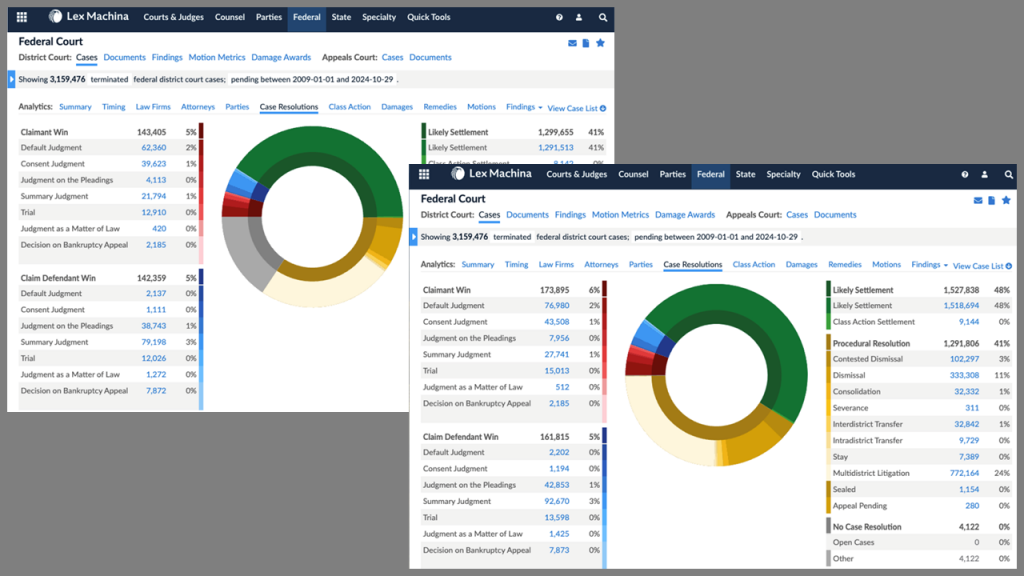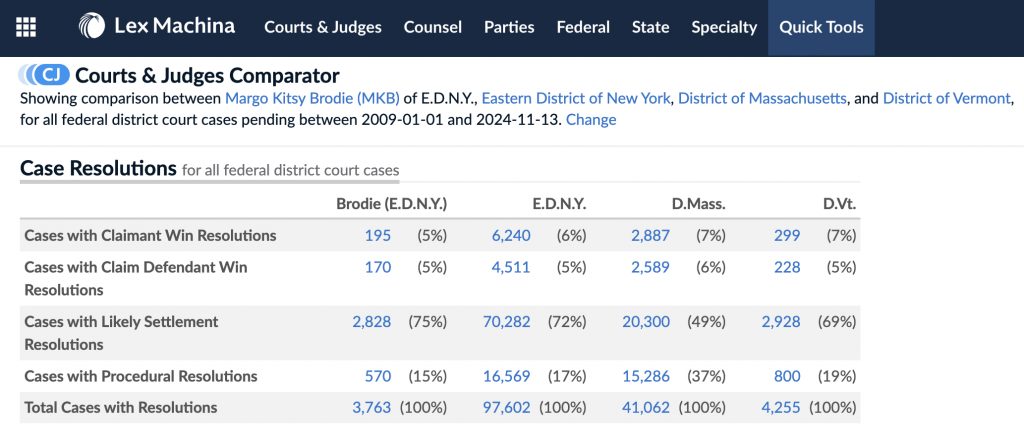The litigation analytics firm Lex Machina has accomplished what it describes as a milestone growth of its knowledge set of courtroom paperwork, including one other 500,000 federal district courtroom circumstances in order that it now has full protection of just about each civil case filed in federal district courts wherever in the USA.
The one civil circumstances it doesn’t embrace are prisoner petitions, which the corporate deemed not commercially related to its buyer base of legislation corporations and firms.
Till now, Lex Machina’s analytics have been centered on particular, main follow areas (at the moment 22 follow areas), and in its assortment and tagging of federal circumstances, it prioritized these follow areas. However with this newest growth, it has added the remaining 15% of district courtroom circumstances that didn’t match underneath a kind of main follow areas.
“This can be a fairly huge milestone when it comes to our total growth to cowl all civil litigation in federal district courtroom,” Carla Rydholm, common supervisor and head of product at Lex Machina, advised me throughout a briefing this week. “Now we now have the flexibility to supply protection of each commercially related case.”

Earlier than this replace, some analytics confirmed a gray space for the 15% of circumstances not accounted for. Now, the analytics give a full image.
Whereas analytics by follow space stay the first focus of the platform, it now permits customers to check analytics throughout all federal circumstances, with out having to pick out a case sort, after which drill down into extra granular knowledge based mostly on courts, judges, counsel, events, and different filters.
Along with tagging circumstances based mostly on the 22 major follow areas, Lex Machina has now added tagging for an additional 5 classes: admiralty/maritime, forfeiture/penalty, FOIA, immigration, and RICO.
Instances that don’t match inside any of those follow areas will probably be tagged as uncategorized, however customers will be capable of view the federal nature-of-suit code that was utilized to the unique submitting.

The place comparisons beforehand could possibly be accomplished solely inside a follow space, they’ll now be accomplished throughout all circumstances.
This enhanced knowledge set can be accessible by way of the litigation analytics function of the authorized analysis platform Lexis+. Lex Machina is owned by LexisNexis.
The importance of that is that customers will get a very full image of federal courtroom analytics that embody not simply the 85% of circumstances beforehand lined however 100% of circumstances. That signifies that when they’re exploring analytics for components corresponding to outcomes, damages, or treatments, they’re getting the excellent view.
Key to Lex Machina’s analytics is how the corporate processes the uncooked case knowledge after assortment — cleansing, tagging, coding and enhancing the information in order that it may be analyzed throughout various parameters.
It permits customers to discover analytics based mostly on entities — judges, courts, legislation corporations, attorneys and events — and by outcomes — case resolutions, timing, damages, findings, treatments and movement metrics.
Lex Machina advanced out of a analysis mission launched in 2006 at Stanford Regulation Faculty to gather and analyze knowledge on patent circumstances. Since its acquisition by LexisNexis in 2015, it has steadily added extra follow areas, expanded into state courts, added analytics for federal courts of appeal, and added Litigation Footprint for visualizing litigation.
With this newest traunch of circumstances, Lex Machina can now present these outcome-driven analytics, together with damages and case resolutions, for over 3.7 million federal district civil circumstances, based mostly on knowledge from 17.5 million paperwork.
Together with this launch, Lex Machina has up to date sure instruments and added new capabilities that it says will permit for extra depth, element, and nuance. A brand new “Customized Columns” function streamlines the creation, sharing, and export of personalized reviews, it says, whereas a brand new “Findings Search” function permits customers to go looking findings inside a selected follow space for findings which can be most related to their very own case and follow.


